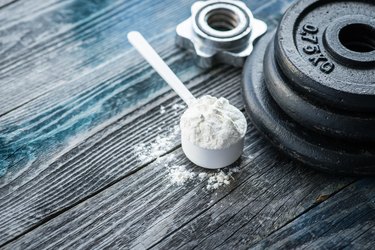
When you want to get the most out of your workout, you make sure every rep, step and weight really counts. Of course, dragging yourself out of bed first thing for a workout can be less than inspiring.
Enter the pre-workout supplement, designed to help amp you up for a better, more effective workout. But before you down that caffeine-laced drink, make sure you know how it's going to affect your body during exercise — you may find that a natural alternative is a healthier choice.
Video of the Day
Video of the Day
Tip
Pre-workouts can boost your energy and improve exercise performance. Ingredients vary — read the label carefully to be sure it's safe for you.
Why Take Pre-Workout?
While different pre-workout supplements make different claims, their main purpose is to supposedly help you get more out of your workout by increasing your energy and blood flow to the extremities. When taken before a workout, they're designed to help you have better focus, lift heavier and have more energy for a tough workout.
A study published in 2018 by Journal of the International Society of Sports Nutrition found that using a pre-workout before exercise did increase cardiovascular activity, as well as muscle strength and endurance in participants. However, the study also emphasizes that more research is needed relative to the long-term efficacy, pre-workout side effects and safety of these supplements.
Read more: The Best Pre-Workout Foods to Eat
How They Work
Pre-workouts contain ingredients that cause certain effects in your cardiovascular system. The most prevalent ingredient in pre-workout supplements is caffeine. Typical supplements can contain anywhere from 100 to 300 milligrams of caffeine, which is up to three times the amount in a cup of coffee.
Other ingredients include arginine, which is known to increase blood flow to your extremities, and a stimulant called dimethylamylamine, which increases heart rate and has prompted a warning from the U.S. Food and Drug Administration (FDA).
Pre-Workout Side Effects
Pre-workouts can help you feel more energized and experience success during your workouts, but the price of those benefits might be too high. In 2011, Army Private Michael Lee Sparling collapsed after taking a pre-workout supplement and running for 10 minutes with his unit. He went into cardiac arrest and passed away later that day, reported the the New York Times.
Because pre-workout supplements can raise your heart rate, combining them with strenuous cardiovascular activity can put excess strain on the heart. Other less-serious side effects can include a jittery feeling, increased energy, headaches and nausea.
Supplements can interact with some medications. Be sure to tell your doctor if you consume workout supplements.
Alternatives to Pre-Workouts
You don't need pre-workout supplements to have an effective exercise session. The FDA doesn't regulate supplements in the same way it does medicine, which could mean that the proper studies have not been completed to predict how a supplement will affect your performance — or your health. Instead, focus on healthy nutrition as a way to fuel your workout.
By eating food that's high in complex carbohydrates and lean protein, you'll have long-lasting energy to help you get through your workout without the negative side effects. Try a couple of bananas with peanut butter or wheat crackers and a few slices of cheese instead.
- U.S. Food and Drug Administration: Stimulant Potentially Dangerous to Health, FDA Warns
- The New York Times: Is the Seller to Blame? Workout Supplement Challenged After Death of Soldier
- CrossFit Invictus: Caffeine Based Pre-Workout Supplements…Friend or Foe?
- Journal of the International Society of Sports Nutrition: Multi-Ingredient Pre-Workout Supplements, Safety Implications, and Performance Outcomes: A Brief Review